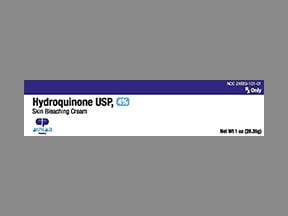My prescription
Edit
28.35GM of 4%, Hydroquinone (1 Tube)
Select pharmacy

CVS
$27.13
COUPON PRICE
Walmart
$21.78
COUPON PRICE
Albertsons
$30.32
COUPON PRICE
Walgreens
$31.66
COUPON PRICEHydroquinone savings card
Show this card to your pharmacist
Walmart
$21.78
BIN
ID
PCN
GRP
019876
LH2711F29D
CHIPPO
LHX
Powered by
More prescriptions for skin discoloration
More prescriptions for skin discoloration
Price history for Medorfa (brand) & Hydroquinone (generic)
1 Tube, 28.35GM of 4%
Average retail price for Medorfa
Average retail price for Hydroquinone
Average SaveHealth price for Hydroquinone
Our price history data is based on aggregated prescription data collected from participating pharmacies in America. Our prescription data updates daily to reflect the latest price changes. If you notice a missing data point, it means there wasn't sufficient data available to generate a monetary value for that date.
We analyzed Hydroquinone prices for (28.35GM of 4%, 1 Tube) over the last 12 months. The average retail price was $265.94, while the average price using the SaveHealth discount card was $33.99. That's a savings of approximately 87.22% when using our Hydroquinone coupon.
Compared to the generic version, Medorfa had an average price of $77.59 over the same time period. With the SaveHealth savings card, Hydroquinone is 56.19% cheaper on average than Medorfa.
*Retail prices are based on pharmacy claims data, and may not be accurate when we don't have enough claims.
Hydroquinone dosage forms
Dosage Quantity Price from Per unit 28.35GM of 4% 1 Tube $21.78 $21.78 28.35GM of 4% 2 Tubes $35.95 $17.98 28.35GM of 4% 3 Tubes $52.78 $17.59
| Dosage | Quantity | Price from | Per unit |
|---|---|---|---|
| 28.35GM of 4% | 1 Tube | $21.78 | $21.78 |
| 28.35GM of 4% | 2 Tubes | $35.95 | $17.98 |
| 28.35GM of 4% | 3 Tubes | $52.78 | $17.59 |

